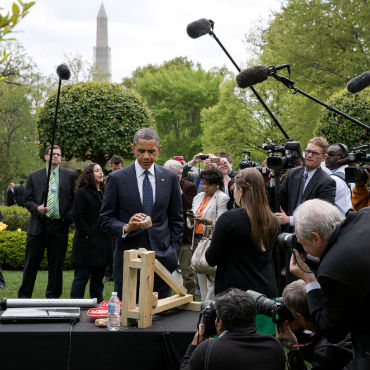Satellite, data projects on White House agenda
Global internet connectivity, artificial intelligence and a manned mission to Mars are some of the big ideas at the Frontiers Conference.

President Barack Obama examines an entry in the 2013 White House Science Fair.
The Obama administration is set to issue $300 million in funding for new science and technology projects with the goal of spurring emerging markets and investment nationwide.
The initiative, which is scheduled to be announced at the White House Frontiers Conference in Pittsburgh on Oct. 13, includes $50 million in federal funding to support small satellite technology that could provide worldwide internet connectivity and continuously updated Earth imagery, Deputy U.S. CTO Ed Felten said in an Oct. 12 conference call with reporters.
Other new efforts include $165 million in public and private funds to support cities' use of technology and data to tackle critical quality-of-life challenges, such as traffic congestion. The National Institutes of Health will also receive $70 million in new investments for brain disease research.
Additional steps in President Barack Obama's goal to send a manned mission to Mars by 2030 will also be unveiled at the conference. He outlined his vision for that mission in a CNN op-ed article on Oct. 11.
The Frontiers Conference -- co-hosted by the White House, the University of Pittsburgh and Carnegie Mellon University -- brings together top technology experts, innovators and companies to discuss how science and technology can help improve lives in the next half-century.
The event is also meant to burnish the president's technological legacy as he prepares to leave office. "I'm sure President Obama is the most science-savvy president since Jefferson," Felten said.
The same day as the press call, the White House released a report on the future of artificial intelligence because of an explosion of interest in the technologies, Felten said. Top policy priorities for AI in the coming years include understanding its impact on jobs and the economy.
Development of safety and regulatory frameworks are also priorities. In an interview with Wired magazine on Oct. 12, Obama highlighted concerns that advanced AI algorithms could game stock markets. (Obama also served as guest editor of Wired's November issue.)
On the press call, Felten said less sophisticated forms of AI are already being used in auto-trading applications, but efforts are being made to maintain stock markets' stability.





